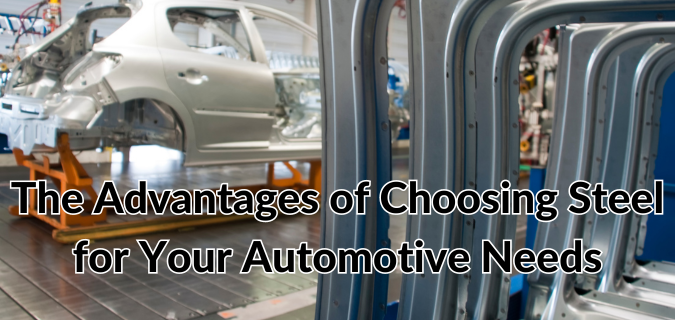
Steel is incredibly valuable in the automotive industry, as its versatility allows it to be used in just about every part of a vehicle for a variety of purposes. The immense strength and relative light weight of steel make it ideal for protection, support, and cost-effectiveness. From the frame and chassis to roofs, door beams, wheel rims, radiators, exhaust pipes, bushings, bearings, and body panels, steel is almost always the right choice in the automotive industry. a highly important and prevalent material in most automobiles.
Types of Automotive Steel
One reason steel is so versatile for automotives is due to the different types and steel alloys used to serve specific purposes. The five main types include:
Stainless Steel
Although stainless steel is lauded for multiple reasons across many industries, the main automotive values of stainless steel are its resistance to corrosion, ability to endure extreme temperatures, and overall durability. Stainless steel is often found in exhaust systems, engines, and in assembling different components.
High-Strength Steel
High-strength steel, or advanced high-strength steel (AHSS), is tough, ductile, lightweight, and has a tremendous fatigue rating. The lightweight AHSS helps keep costs down and is ideal for frames, bodies, and undercarriages.
High-Carbon Steel
The main benefit of high-carbon steel in automotive applications is its resistance to wear, making it ideal for components that must withstand a lot. Mufflers, door panels, bushings, frames, and the chassis often feature high-carbon steel.
Low-Carbon Steel
Low-carbon steel’s inexpensive production costs make it a regular contributor to automotive components. Although it has a lower tensile strength than high-carbon steel, low-carbon steel will often be seen in brackets, housings, and suspension parts, as well as many visible exterior parts like rims, screws, washers, nuts, bolts, and fasteners.
Galvanized Steel
With a lower cost than stainless steel, galvanized steel is coated with a thin layer of zinc and helps minimize repairs and maintenance on cars, trucks, and motorcycles. Galvanized steel is durable, abundantly available, and less expensive than high-carbon and high-strength steel in vehicles.
Why Choose Steel Over Other Materials in the Automotive Industry
Steel has been—and continues to be—the most prevalent material in automobiles. Its reliability and versatility, plus its evolution over time through innovative engineering, make steel the ideal material for automotive applications. Given the material’s balance between safety, style, affordability, weight, and feasibility, it’s hard to argue with steel. Steel is also the most recycled material in the world, which contributes to the environmental responsibility that is becoming more of a priority for manufacturers.
When Steel Might Not be the Right Choice
While steel is almost always the right choice, automotive manufacturers may decide on a few alternatives. The main reason for using other materials in production is to reduce weight and increase fuel efficiency. The following are typical alternatives to steel:
- Aluminum is a popular steel alternative due to its lighter weight (an aluminum panel weighs approximately half what a steel panel of equal strength weighs) for parts like engine blocks, suspension components, and wheels. These need to be lighter in some circumstances to increase fuel efficiency, but aluminum is only most economical in low-volume production. In most cases, it will cost more to use aluminum rather than steel. Plus, with new steel technologies significantly reducing the weight of steel as well, aluminum isn’t as far ahead in the lightweight department as many think.
- Plastics do an excellent job of fending off dents and chips from road debris, so they are often used for bumpers. However, any structural parts require thicker panels and can risk inconsistency in the part quality when produced at a high volume. A former benefit of plastics was its complete resistance to corrosion, but stainless and galvanized steel now also have this capability, so spending more on plastic is often impractical.
Choose Capital Steel & Wire for Automotive Steel Products
We’re here to help you make an informed decision on the best steel for your automotive needs. With current and evolving steel technologies and the versatility of alloys, almost every part of an automobile uses steel in some form. Contact us today to discuss options in automotive sheet steel and all steels for other applications.





